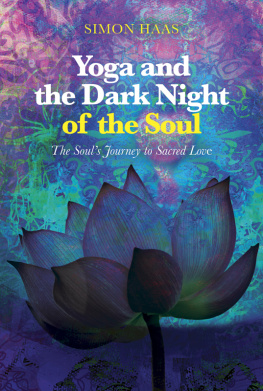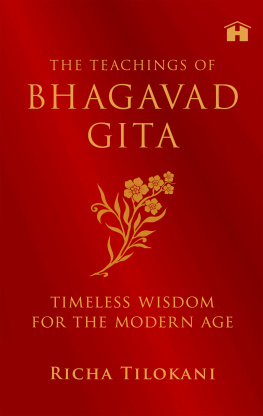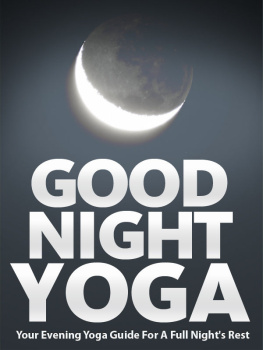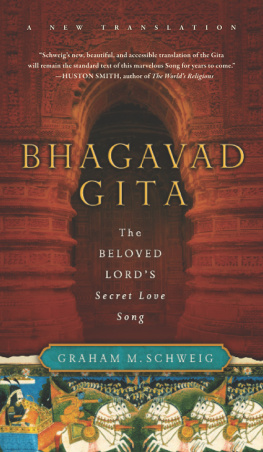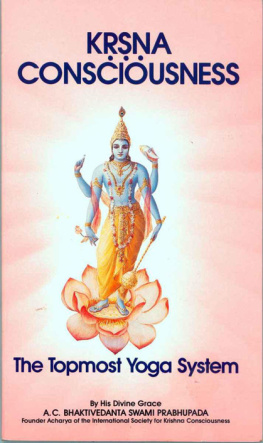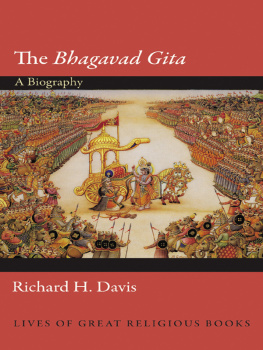Acclaim for
YOGA AND THE DARK
NIGHT OF THE SOUL
What do Arjuna (of Bhagavad Gita fame) and St. John of the Cross have in common? Among other things, both experience a dark night of the soulthat is to say, they undergo necessary purgations on the path to transcendence. But do these two luminaries have a monopoly on this proverbial dark night? No. We are all privy to such existential tribulation, sooner or later, and Simon Haas makes careful record of this. In his stimulating and informative work, Yoga and the Dark Night of the Soul, Haas uses Arjunas dark night to explore his own, thereby lending a hand to his own healing and, by extension, to ours. His focus, in particular, is the yoga tradition and Indias ancient bhakti texts, primarily the Bhagavad Gita. Drawing on his own realization and that of the sages, he brings readers into the light of enlightenment, showing us that the dark night is not so dark after all, but is, rather, a catalyst to illumination. This is an authoritative, metaphysical book on yoga that takes one beyond the needs of the body and mind and situates one in spiritual luminescence. What more can a discerning reader ask for?
STEVEN J. ROSEN (SATYARAJA DASA), author of some thirty books on Vaishnavism and related subjects; senior editor of the Journal of Vaishnava Studies; and associate editor of Back to Godhead magazine
A true delight and pleasure to read, which I hope to share with young people across the world who wish to deepen their understanding of the true, majestic science of yoga.
CHARLOTTA MARTINUS, founder of TeenYoga and Director at Universal Yoga Ltd
Simon Haas has done it again. With the clear perception of a sage, he has retold this ancient classic, the Bhagavad Gita, in a way everyone can understand. I have used Haass The Book of Dharma: Making Enlightened Choices as a course book for our students in yoga teacher training. This too will become part of our curriculum.
DR RICHARD A. MASLA, founder of Ayurveda Health Retreat and of YogaVeda School of Yoga & Ayurveda
Haas draws generously from the Bhagavad Gita and other classical yoga texts, alongside colourful narratives from his own spiritual journey and travels. From a little girl at Heathrow airport and a dog on the Yorkshire Moors, to holy men in crematoriums and Indian monkeys, we hear inspiring stories sure to open our hearts and minds in learning to appreciate the potential power in darkness to rewrite our own life stories from ones of fear and confusion into those of love and compassion.
CATHERINE L. SCHWEIG, chief editor of Goddess: When She Rules (Golden Dragonfly Press, 2017) and author of over fifty articles on yoga and the Bhagavad Gita
Yoga and the Dark Night of the Soul is by far one of the best books Ive read. Its an eye-opening and heart-touching, beautifully crafted tapestry on the nature of difficult life experiences, and on how best to navigate through them. Every page and chapter has an uplifting message and delivers immense value for the well-being of the body, mind and self. I highly recommend it.
ARIADNA LANDMAN, Ayurvedic medicine teacher and practitioner; founder of VitalVeda
The writing is beautifully balanced, simple yet profound and poetic, eloquent yet direct and accessible. Simons insights, guidance and stories warm the heart and mind.
DYLAN HENDRIX, teacher of yoga and author of Art of the Storm (Balboa Press, 2017)
A timely yoga read and ideal travel companion. I highly recommend this yoga book to anyone on a yoga journey, especially yoga teachers and students; it is a must.
TWANNA DOHERTY, CEO at Yogamatters
As an accomplished representative of an authentic spiritual tradition that has taught the Bhagavad Gita for millennia, Simon Haas guides us on a mystical journey within ourselves that leads to realms of everlasting, transcendent happiness. Yoga and the Dark Night of the Soul makes for compelling reading and is sure to become a classic in its genre.
KRISHNA DHARMA, author of the worlds bestselling retellings of the great Indian epics Mahabharata and Ramayana
Simon Haas elegantly sheds light on the ancient text Bhagavad Gita, revealing its profound relevance to daily life. Haas weaves beautiful real-life stories into the context of this ancient wisdom, making it accessible at a time when it is so needed, in a way that perhaps has never been done before.
JONATHAN GLASS, M.Ac., C.A.T., Ayurveda practitioner and author of Total Life Cleanse: A 28-Day Program to Detoxify and Nourish the Body, Mind, and Soul (Healing Arts Press, 2018)
Readers interested in the subject matter of this book are invited to correspond with the author at
Published by Veda Wisdom Books
an imprint of The English Word Factory
Simon Haas 2018
The moral right of the author has been asserted
All rights reserved
No part of this publication may be reproduced, stored in a retrieval system, or transmitted in any form or by any means, without the prior permission in writing of the publisher, nor be otherwise circulated in any form of binding or cover other than that in which it is published and without a similar condition including this condition being imposed on the subsequent purchaser
Veda Wisdom Books is committed to a sustainable future. All our books are printed on at least partly recycled or sustainable paper.
First published in Great Britain
First edition, 2018
ISBN 978-0-9575185-2-0
Prologue
The Journey
Homo sapiens sapiens, human, the extremely wise. Thats the name weve given our species.
Today, we have access to more information than ever before, yet it struck me (even at a young age) that were still far from wise. The name weve given humankind is more of an aspiration, an aim. Given the destruction of our planet and our capacity for greed, suffering and irrational delusions, we might, perhaps more truthfully, have named our species Homo avarus, human, the greedy, Homo vastans, human, the destroyer or Homo patiens, suffering human.
As a young teen, I wondered why so many of us live in a state of restless dissatisfaction with life. I hoped I might find a mentor, an example to follow; but wherever I looked, I saw people struggling with the same basic challenges: jealousy, anger, frustration, boredom, dissatisfaction. I was no exception, of course. A witness to the difficulties experienced by loved ones, I questioned Western cultures response to crises and where our perspectives might be failing us.

